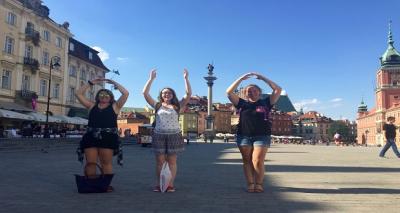
The Polish Studies Initiative (PSI) is excited to announce that we are accepting applications for scholarships and grants for study abroad and research in Poland for summer 2017. The PSI Scholarship application is open to all
undergraduate and graduate students who are interested in pursuing more advanced training. The amount of award ranges between $500 and $1,000. PSI grants are available for faculty and post-candidacy PhD students at Ohio State. Applicants can request up to $1,500 in funds for research in the arts, humanities and social sciences that will enhance the understanding of Polish society and culture.
In 2016, PSI awarded two undergraduate students scholarships to study abroad in Poland during the 2016 summer semester. Alyssa Neville and Lauren Sayers received PSI scholarships and participated in the Summer School in Social Sciences in Warsaw, Poland at the Polish Academy of Sciences. They studied under Ohio State Professor Kazimierz M. Slomczynski, learned skills in statistical analysis and conducted independent research. PSI also awarded a grant to Department of Slavic and East European Languages and Cultures (DSEELC) graduate student Izolda Wolski-Moskoff to conduct research for her dissertation in Poland over the summer.
Lauren Sayers is a double major in criminology and criminal justice with a minor in forensic science. She would

like to become a prosecuting attorney and serve as an advocate for the victims of injustice. While studying in Warsaw, she was able to examine the justice system in Poland and showcase her research, “Justice for All? Economic Disadvantage and Trust in the Judicial System.” Sayers said of her experience, “ …(t)he summer school was an amazing experience, presenting an academic challenge and opportunities to learn from scholars of many different countries.”
Alyssa Neville is a double major in Russian and criminology. After graduation, she would like to complete a master’s in Russian or Slavic Studies and eventually work for the federal government. During her time in Poland, Neville increased her knowledge of Eastern Europe from a sociological point of view and also learned basic statistical skills that are useful for her research. Neville used POLPAN data (a survey administered to Polish citizens every five years from 1988-2013) to answer the question “Are political biographies from the post-socialist era in Poland influencing the Poles’ attitudes towards democracy?” She also examined the social and political culture in Poland to understand how individuals and social groups perceive democracy. In addition to her academic pursuits, Neville gained confidence in her ability to navigate in foreign countries where she did not speak the languages.
Izolda Wolski-Moskoff is a post-candidacy PhD student who is studying the acquisition of cases in Polish heritage speakers. While in Poland, Wolski-Moskoff met with 15 individuals from various socio-economic backgrounds between the ages of 40 to 60 years old. She gave them three different tasks in order to evaluate their use of cases, including: narrating a wordless picture book, completing a sentence with nouns provided on a card and examining whether a sentence was grammatically correct. In early 2017, Wolski-Moskoff will meet with Polish heritage speakers in the U.S. and conduct the same experiments and compare the data. Prior research on this topic suggests that immigrants who live outside of their home country for a long period of time may lose some elements of their language. Wolski-Moskoff aims to understand if these changes are possible in the area of nominal morphology. After collecting data from Polish speakers in the United States, she will be able to determine if Polish heritage speakers use cases differently than Polish speakers in Poland.
